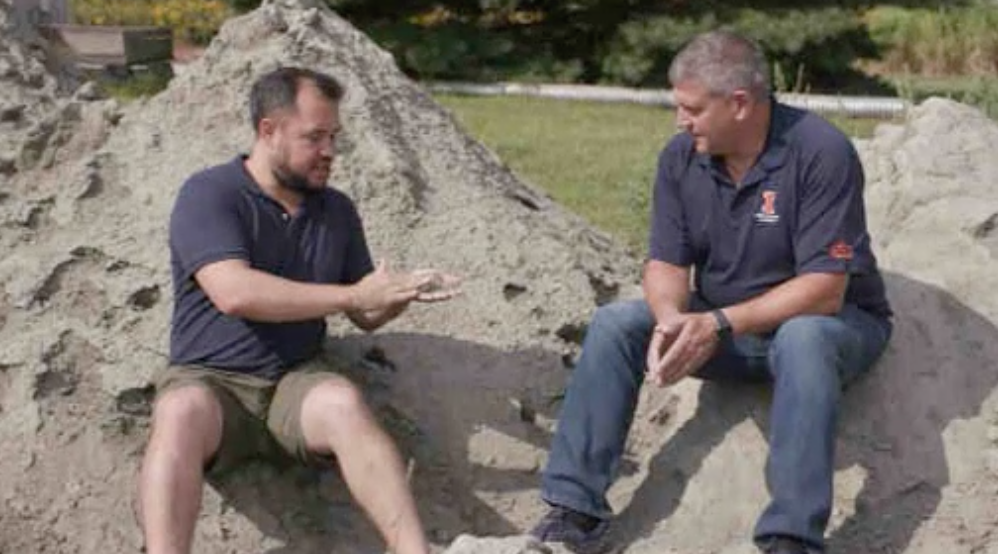BBC’s Follow the Food to feature RIPE researcher’s Rock Dust project
On Saturday, March 12th, 2022, the Realizing Increased Photosynthetic Efficiency (RIPE) project’s Carl Bernacchi will be featured on an episode of Follow the Food on BBC World News. Hosted by world-renowned ethnobotanist and television presenter James Wong, the multimedia series focuses on the toughest pressures on the global food system including RIPE’s central mission of how to feed the growing population, and climate change, which is the focus of the current season.

The upcoming episode “Turning Back The Climate Clock” focuses on the rock dust projects, led by Research Plant Physiologist for the U.S. Department of Agriculture, Agricultural Research Service (USDA-ARS) Carl Bernacchi (CABBI/GEGC).
“Rock dust is a type of basalt—a volcanic rock, a waste byproduct of the mining industry—and we are trying to find a use for it that can benefit both agriculture and the global carbon cycle,” said Bernacchi, while speaking with Wong.
Carl’s team from the Levenshulme Centre for Climate Change Mitigation are spreading this basalt onto fields to discover if it can boost carbon sequestration in the soil, reducing the amount of CO2 in the atmosphere and thereby reducing global climate change.
Episode 8 “Climate Clock” is premiering on Saturday, March 12, 2022, at 9:30 AM (CST) and on Sunday, March 13, 2022, at 3:30 AM (CDT) and 2:30 PM (CDT) on BBC World News and will be available afterward on the Follow the Food website.
Last summer, Wong visited two different research projects at Illinois that had two unique solutions to address the effects of climate change on the food system.
The first project featured RIPE’s Deputy Director Lisa Ainsworth (CABBI/GEGC) and how RIPE is working to improve the photosynthesis of crops to increase carbon intake. With the SoyFACE (Soybean Free Air Concentration Enrichment) facility, researchers—for the past 20 years—have been growing food crops such as soybean under atmospheric conditions that are set to replicate those predicted in 2050, where CO2 levels will be considerably higher. This episode “The Carbon Challenge” aired on Friday, October 29th, 2021 on BBC World News.
RIPE, which is led by the University of Illinois, is engineering crops to be more productive by improving photosynthesis, the natural process all plants use to convert sunlight into energy and yields. RIPE is supported by the Bill & Melinda Gates Foundation, Foundation for Food & Agriculture Research, and U.K. Foreign, Commonwealth & Development Office.
Read our news release on “The Carbon Challenge” here.
Follow the Food’s “Turning Back The Climate Clock” featuring RIPE premieres:
US (CST): 3/12 - 9:30AM
UK (GMT): 3/12 - 3:30PM
AUS (AEDT): 3/13 - 2:30AM
US (CDT): 3/13 - 3:30AM and 2:30PM
UK (GMT): 3/13 - 8:30AM and 7:30PM
AUS (AEDT): 3/13 - 7:30PM and 3/14 - 6:30AM
US (CDT): 3/15 - 6:30PM
UK (GMT): 3/15 - 11:30PM
AUS (AEDT): 3/16 - 10:30AM
How to watch BBC News outside of the UK:
The episode will be made available on the BBC websites bbc.com/followthefood and bbc.com/reel. BBC World News is also available in the US from numerous television service providers, as well as a number of streaming services. Contact your specific provider for more details.
RIPE is led by the University of Illinois in partnership with The Australian National University, Chinese Academy of Sciences, Commonwealth Scientific and Industrial Research Organisation, Lancaster University, Louisiana State University, University of California, Berkeley, University of Cambridge, University of Essex, and U.S. Department of Agriculture, Agricultural Research Service.
